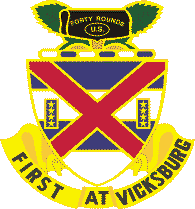13th Infantry Regiment, US Army: Difference between revisions
Knorrepoes (talk | contribs) m (Text replacement - "|Arms of {{PAGENAME}}]]" to "|Coat of arms (crest) of {{PAGENAME}}]]") |
Knorrepoes (talk | contribs) m (Text replacement - "↵↵↵Literature" to " Literature") |
||
| Line 23: | Line 23: | ||
The coat of arms was originally approved on 8 February 1922. It was amended on 2 October 1923. | The coat of arms was originally approved on 8 February 1922. It was amended on 2 October 1923. | ||
[[Literature]]: Image and Information from Wikimedia Commons. | [[Literature]]: Image and Information from Wikimedia Commons. | ||
Revision as of 18:32, 20 August 2023
13TH INFANTRY REGIMENT, US ARMY
| (Coat of Arms) |
(Distinctive Unit Insignia) |
Official blazon
Shield: Barry of four Azure and Argent, saltire Gules, and in fess two billets paleways Sable fimbriated Or each bearing four mullets of the second
Crest: On a wreath of the colors two palm branches saltirewise Proper and thereon a McKeever cartridge box Sable bearing the legend "Forty Rounds" "U.S." Or.
Motto: FIRST AT VICKSBURG.
Origin/meaning
The 13th Infantry was organized in 1861. General Sherman was its first Colonel and General Sheridan one of its original Captains.
The four blue and white bars of the shield are the old and the present infantry colors and indicate the four wars in which the regiment has participated.
The saltire cross is from the Confederate battle flag with the color changed from blue to red. The billets are the shoulder straps of the two generals which this regiment has raised.
The crest is the corps badge of the 15th Corps of the Civil War and the motto is the proud designation given the regiment by General Grant.
The coat of arms was originally approved on 8 February 1922. It was amended on 2 October 1923. Literature: Image and Information from Wikimedia Commons.

